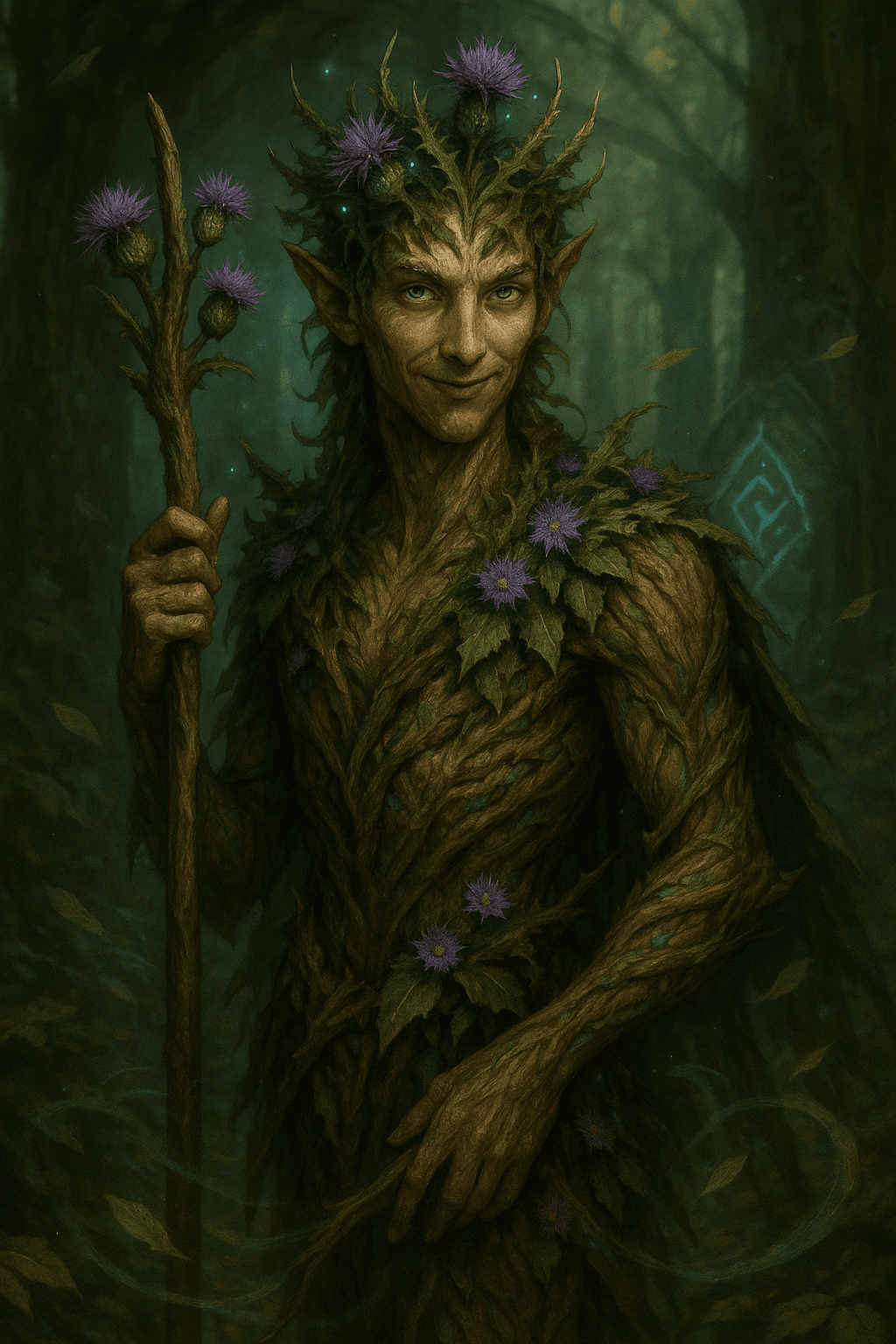Thistlebrand
The forest grins—and its grin has thorns.

There are guardians who stand like stones, and there are guardians who dance. Thistlebrand is the latter: a sylvan spirit shaped from wild laughter, burrs, foxfire, and the quick intelligence of a forest that refuses to be predictable. He wears a cape of thistle-down and briar-bloom, changes height with the shadow of a passing cloud, and speaks in truths that sound like jokes until the punchline saves your life. Children leave him honey; poachers fear his footsteps because they never quite come from the right direction. Ask three beasts what color his eyes are and you’ll get four answers—each of them right for the moment they looked.
Thistlebrand’s vows are older than ink. He keeps watch where the leylines braid tight beneath Galdrowen, those bright knots of living power the Verdant Circle wards like hearts. To him the task is half-play, half-prayer: if curiosity approaches with clean hands, he teaches; if greed arrives with a knife, he misplaces the hand that holds it. His mischief is a form of medicine. Confusion heals ambitions that would otherwise cut.
Ascendance.
When the Circle ripened from scattered groves into a true order, the elders discovered that warding a forest meant more than sentries and sigils; it meant temperament. Not every problem wanted a wall. Some wanted a mirror, or a maze, or a joke with a lesson embedded like a seed. Thistlebrand became that lesson. Archdruid Fen Mossbark—patient, powerful—trusted the spirit with the most delicate work: keeping leyline nodes “untampered,” which often meant intercepting the well-meaning and the merely foolish before bad ideas grew teeth.
To a novice druid who tried to anchor a ritual stone with iron nails, Thistlebrand arrived as a beetle the size of a mug, muttering complaints about the taste of metal until the student laughed, pulled the nails, and learned to lash with living root. When Skyreach scholars sought a closer look at a singing spring, he led them in tidy circles until they admitted their measurements would drown the music; he then showed them where the song could be heard without harm and bargained for star-charts as payment. “Balance,” he told them, “is not a line on the ground. It’s a conversation you keep having.”
He was notorious among border wardens and beloved by them as well. Poachers swore the trees shuffled when he winked; true-hearted patrols found shortcut paths blooming under their boots. Kara Windshade claimed her notes on thorn-venom were safer when Thistlebrand napped atop the satchel—“He snores like a cricket,” she said, “and thieves trip over the rhythm.”
Fracture.
When the Shattering tore the leylines ragged and turned parts of Galdrowen into jittering echoes of themselves, the forest needed a different smile. Duskfall’s Whispering Bloom sent scouts made of shadow and patience; their steps left no prints, their minds wore fog like veils. Thistlebrand met subtlety with subtler kindness—and a sharper edge. He wove hallucinated paths between mirrors of dew, where every choice led intruders away from power and toward quiet ponds that reflected their own faces too clearly to bear. “Look,” the water seemed to say, “and decide if you wish to be the kind of secret that harms.”
Not all enemies paused. For those, he staged chaos. Memory Drakes trying to harvest ley-echoes found their crystals singing lullabies that turned courage to drowsy caution. Vine-crests that reached for waystones discovered their tendrils had tied themselves into sailor’s knots. When the Choir of Ember’s ash-raiders tested the forest, Thistlebrand turned sparks into fireflies that drifted home like guilty thoughts, revealing camps the Circle’s scouts could scatter without blood.
Even allies were not exempt from his tricks. A warden too eager for vengeance woke with briars woven around her wrists—not tight enough to wound, just annoying enough to slow the hand that would have struck first. Rootcaller Brannok, grief-heavy from pacifying feral broods, found his patrol route a touch shorter each day until he slept a full night. Thistlebrand would not say he cared; he would only complain that tired bears make poor company. In these years he showed his oldest truth: mischief is mercy wearing thorns.
Through all of it, the leyline nodes held. Some cracked, many hummed sour for a time, but the worst trespasses lost their way. “You can’t break a path you can’t find,” Thistlebrand liked to say, blowing thistle-down that always floated upwind. The Verdant Circle’s ledgers record no monument to him—only fewer injuries where confusion should have caused more, and a pattern of near-disasters that never quite learned how to happen.
Thistlebrand does not ask for thanks. He prefers stories. The best repay him by being told, because told stories become trails that keep wanderers from the most fragile places. If you meet him on the border and he offers you a riddle, answer honestly—even if the answer is “I don’t know.” The forest loves “I don’t know.” It hears room to grow.
